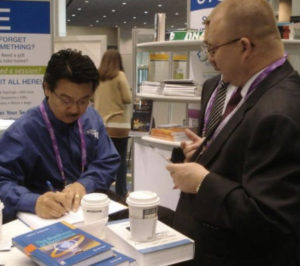By Jim Stafford
Copyright © 2017, The Oklahoma Publishing Co.
In his second book, “Biotechnology Entrepreneurship: Starting, Managing and Leading Biotech Companies,” Craig Shimasaki, Ph.D., titles one section “Learning from Failure.”
“Failure is not a person or way of life; failure is an event,” Shimasaki said. “Interestingly, you learn immeasurably more from things that don’t work the way you thought, rather than things that line up right all the time. Such impediments and challenges drive you to find novel ways to solve complex problems in science and in business.”

In addition to being the author of two books on biotechnology entrepreneurship, Shimasaki is a serial entrepreneur who, over the past 30 years, has participated in co-founding three Oklahoma-based life science companies.
Although two of them are no longer in operation, Shimasaki has bounced back from obstacles that would cause others to give up.
Today, he is co-founder and chief executive officer of Oklahoma City-based Moleculera Labs, which performs specialized blood-testing services for many children and adults afflicted by various neuropsychiatric disorders.
A California native, Shimasaki began his career in South San Francisco with drug development giant Genentech before being recruited in 1987 to Oklahoma to help a start up a life science company that became ZymeTx.
He was one of the co-inventors of the first FDA-cleared rapid influenza tests.
“The company went public, and it did very well in the beginning,” Shimasaki said. “Then the flu didn’t show up for about four years.”
The lack of flu-related demand caused the stock price to decline, the original CEO to leave, and eventually the company had to cease operations.
“But the product paved the way for more rapid point-of-care testing for flu, and literally improved thousands of lives with the ability to detect the flu early which was something you couldn’t do previously,” he said.
When the ZymeTx chapter closed for Shimasaki, he was introduced to a struggling company developing a genetic-testing technology to detect breast cancer before it showed up on X-rays. The company was a spinout of the intellectual property from the Oklahoma Medical Research Foundation (OMRF), but it was getting ready to close its doors.
Shimasaki saw the significance and the medical need, was approved to take the helm of the company and restarted it as InterGenetics.
“Through the support of many, we raised the needed capital to complete clinical testing of over 12,000 women and finalize the product for launch,” he said. “Then the FDA made an unexpected regulation change that impacted the entire clinical lab industry. It put a temporary halt to our ability to initiate commercialization.”
Although the company finally commercialized its product, the two-year delay eventually led Shimasaki to leave InterGenetics.
Soon after, he was approached by Madeleine Cunningham, Ph.D., a University of Oklahoma Health Sciences Center professor.
Cunningham had developed a panel of tests that could aid physicians in identifying whether a child’s neurological and/or psychiatric symptoms could be caused by an autoimmune dysfunction.
Cunningham conducted a clinical trial in which she tested 1,000 children who displayed symptoms such as obsessive compulsive disorder (OCD), tics, anxiety, attention deficit hyperactivity disorder (ADHD), neurological conditions known as PANDAS/PANS (Pediatric Autoimmune Neuropsychiatric Disorders Associated with Streptococcal Infections/Pediatric Acute-onset Neuropsychiatric Syndrome) and sometimes behaviors associated with Autism Spectrum Disorders.
When the tests revealed underlying autoimmune disorders, children could then receive appropriate treatment and they recovered.
Parents from across the nation heard about Cunningham’s technology and pleaded to have their children tested after the clinical trial ended.
“Dr. Cunningham came to me and asked how we can help these children because their parents are calling asking to be tested,” Shimasaki said. “The only way we could provide laboratory results to physicians was by creating a new business and building an entire accredited clinical laboratory.”
The pair licensed the technology from OU and co-founded Moleculera Labs in 2011.
“We started with only a handful of doctors knowing what we were doing but we now have over 750, with dozens more added each month,” Shimasaki said. “Our growth each year has led to performing over 4,400 tests, for thousands of critically ill individuals around the world.”
So, although there is success and failure on Shimasaki’s resume, those terms are conditional and based upon what is done with the outcome.
“You have to qualify what you call success and what you call failure, because there are multiple successful outcomes along the way, even if sometimes a company doesn’t continue to exist,” Shimasaki said. “But success is also defined by the people you have helped, the lives that have been changed by what you have done, and the knowledge you have passed on.”
Shimasaki wrote the book on it.
Read the article at The Oklahoman online








